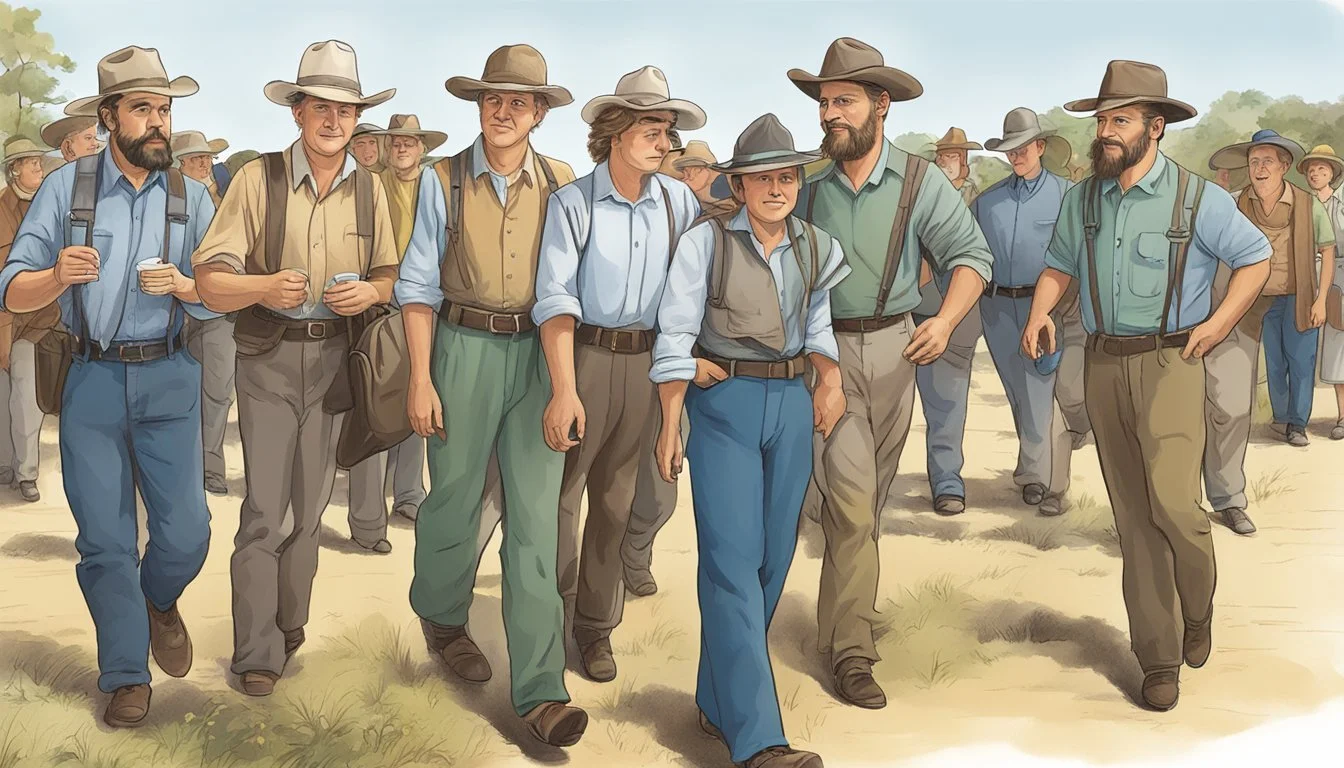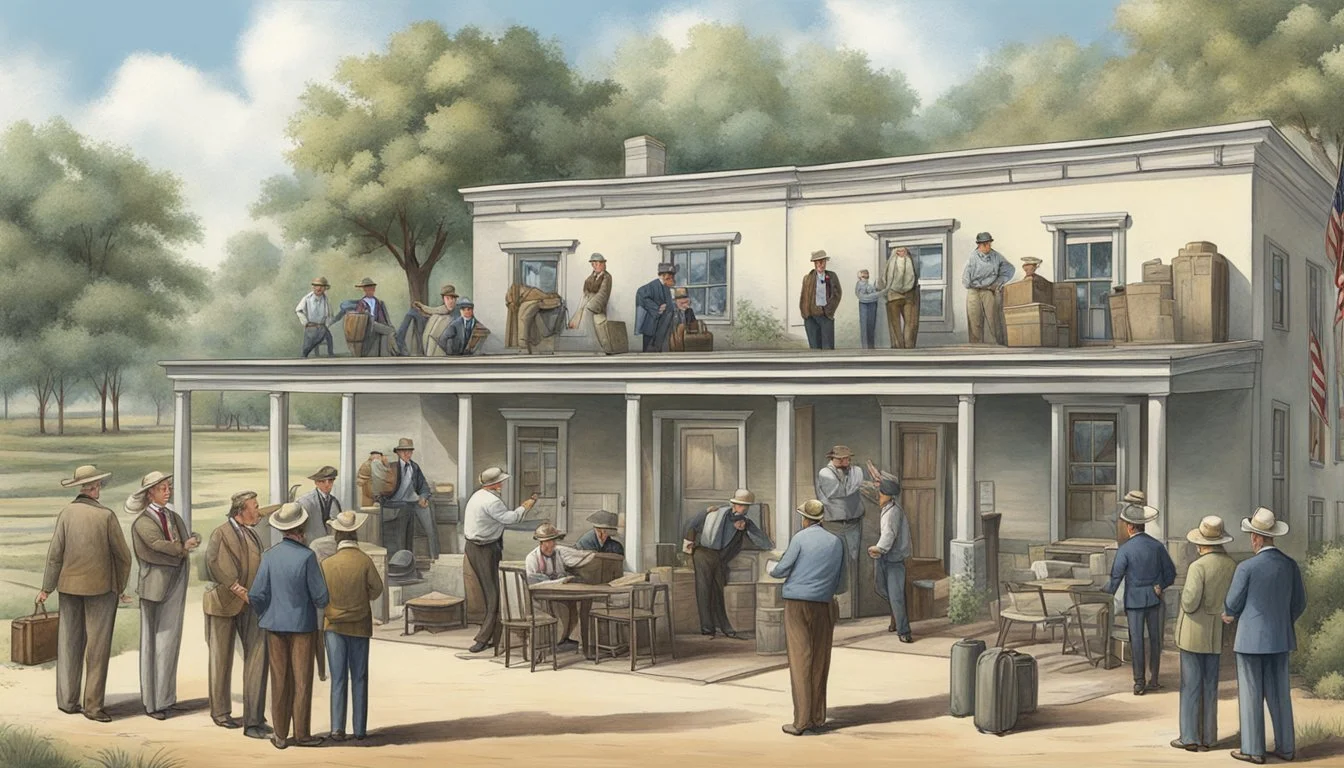The Role of German Texans in Shaping the Texas Insurance Industry Landscape
The influence of German Texans on the Texas insurance industry is a testament to their historical and continued presence in the state. German immigrants began settling in Texas in the early 19th century and quickly became an integral part of the local economy, including the burgeoning insurance sector. The establishment of insurance companies by German Texans has played a significant role in the state's financial landscape, reflecting the community's commitment to fostering economic resilience and stability.
Over the years, Germania Insurance, which started as a mutual aid society for German farmers, has grown into a multi-faceted insurance provider, contributing to the variety of insurance services available in Texas. The story of Germania Insurance, among others, encapsulates the broader narrative of how German heritage has interwoven with Texan identity to create a unique cultural and economic fabric. This synergy is particularly evident in the insurance industry, where the principles of community support and shared responsibility that underpinned early German Texan settlements have translated into modern business practices.
German Texans have not only contributed to the economic strength of Texas through the insurance industry but have also faced historical challenges, such as discrimination during World War I. Despite such setbacks, they have remained pivotal in shaping the state's approach to insurance, emphasizing the value of protection and mutual aid. These principles have permeated various sectors and highlight the distinctive role that German Texans have played in the evolution and advancement of the insurance industry in Texas.
Historical Context of German Immigration to Texas
The German presence in Texas dates back to the 19th century and has had significant influences on various industries, including insurance. Organized migration efforts and the participation in key historical events were pivotal in shaping the role of German Texans.
Origins of the Adelsverein and Settlement Efforts
The Adelsverein, formally known as the Verein zum Schutz deutscher Einwanderer in Texas (Society for the Protection of German Immigrants in Texas), was the main catalyst for German immigration to Texas. Founded in 1842 by a group of German noblemen, the Adelsverein aimed to establish new settlements of German immigrants in Texas. Their efforts led to the formation of notable towns such as New Braunfels and Fredericksburg. The first organized German settlement in Texas was established by Friedrich Ernst and Johann Friedrich Ernst, who are considered the fathers of German immigration to the region, after they had settled near present-day Industry.
Influential German Texans in Early Settlements
German settlers in Texas, known as Texan Germans, quickly established themselves as influential members of their communities. They contributed to the development of agriculture, education, commerce, and the arts. In terms of insurance, Germans brought with them knowledge of mutual aid societies and assistance programs, which would lay the groundwork for insurance cooperatives.
Impact of Wars on German Texans
German Texans experienced significant challenges during major wars, such as the Civil War, World War I, and World War II. Their loyalties were often questioned, and many faced internment and persecution, particularly during the world wars due to widespread anti-German sentiment. Despite these hardships, German Texans continued to contribute to the state's development, and following the wars, they were instrumental in the establishment and growth of Texas's insurance industry. Their influence persisted, even as migration from Germany slowed significantly in the aftermath of these global conflicts.
Cultural Contributions of German Texans
German Texans have played a pivotal role in enriching the state's cultural landscape, particularly through the preservation of their language and traditions, influences in music and festive occasions, and a distinct architectural heritage.
Preservation of German Language and Traditions
German Texans have maintained a robust connection to their ancestral language, German, which continues to be spoken and taught within communities. Notably, cities like Fredericksburg have been pivotal in nurturing this linguistic heritage. Efforts such as German Culture Month and institutions like Saengerrunde Hall serve as platforms for sustaining German literature and educational traditions like school gardens, reminiscent of the ones found in Germany.
German Influence on Texan Music and Festivals
The rich tapestry of Texan culture has been significantly woven with threads from German musical traditions. German Texans introduced numerous musical styles, leading to the creation of Texan polka and oompah bands. Festivals like Oktoberfest and Wurstfest showcase this musical influence and have become staple events, celebrating a fusion of German and Texan culture with an emphasis on food, such as barbecue and beer, and the vibrant sounds of accordions and brass instruments resonating through the German Belt of Texas.
Architectural and Material Heritage
The architectural landscape of Texas bears marks of German craftsmanship, particularly in the Fachwerk style of half-timbered houses. These structures, along with churches and communal halls built by German settlers, impart the aesthetic sensibilities of their homeland into Texan towns. The perseverance of German Texans has ensured that furniture and decor, which echo the quality and style of German design, remain an integral part of the state's cultural heritage.
German Texans in the Texas Economy
German Texans have contributed significantly to the economy of Texas, especially in the areas of ranching, agriculture, transportation, industry, and the financial sector. Their influence is rooted in a history of settlement that created strong economic foundations in key Texas regions.
Ranching and Agriculture Contributions
In the mid-1800s, German immigrants began settling in Central Texas and the Hill Country regions. The favorable climate and fertile lands allowed them to become key players in the state's ranching and agriculture sectors. New Braunfels and San Antonio became centers for German Texans involved in these industries, not just as laborers but also as innovators of farming and livestock techniques. German influence is particularly evident in the cultivation of crops and the raising of cattle, which are central to the area's economic output.
Development of Transportation and Industry
The influx of German settlers, including German nobles, brought with it a wave of entrepreneurship that spurred the development of various industries. In Central Texas, towns like New Braunfels and San Marcos became bustling hubs where German craftsmen and tradesmen contributed to the local economy. Transportation infrastructure, spurred by the need to support these industries and a strong sense of community fostered by various social organizations, experienced enhancement. Railroads and other transportation networks expanded, largely due to the direct involvement of German Texans who understood the value of connecting markets and resources.
German Texans and the Financial Sector
Finance was no exception to the German Texans' economic contributions. By linking their burgeoning agricultural, ranching, and industrial businesses with financial support systems, German Texans facilitated a stable economic environment. In addition to these businesses, they established savings and loan associations, which played a crucial role in financing the economic activities in the state. Many of these institutions were founded on principles brought from Germany, and some were tied to the Lutheran and Catholic churches, reflecting the community's diverse religious background. The establishment of schools and other educational institutions also helped promote financial literacy and business acumen within the community.
German Texans in the Education Sector
German Texans have played a significant role in laying the educational foundations within the Texas education sector, particularly through the establishment of schools and universities, and the promotion of literature and the arts.
Foundations of Schools and Universities
The German Texans’ influence on education began with the establishment of various schools to ensure their children received education that preserved their cultural heritage. One notable institution is the German Free School, founded in Austin in the 1850s. It was the first chartered school of its kind in Texas, emphasizing German language and culture while also adhering to a broader educational curriculum. Additionally, German Texans facilitated the development of universities that have grown to become integral to the Texas higher education system.
Promotion of Literature and the Arts
German Texans also held literature and the arts in high regard, establishing several newspapers that not only kept the community informed but also championed German literature and arts within Texan society. These newspapers, published in German, played pivotal roles in encouraging literary pursuits and the appreciation of the arts. They served as platforms for the distribution of literary work and provided critical support to artists within the community.
Challenges Faced by German Texans
The German Texans, although significant contributors to state industries, including insurance, encountered notable societal and political challenges, especially during the world wars.
Dealing with Prejudice and Assimilation
German Texans faced substantial prejudice and pressure to assimilate, especially during times of national tension. They were often regarded with suspicion due to their cultural ties to Germany. During World War I, anti-German sentiment peaked; they were subjected to acts of violence for any perceived disloyalty, such as criticism of the war effort or refusal to purchase Liberty Bonds – a patriotic act expected of American citizens to support the Allied cause.
In the midst of this strife, the Texas Legislature took legislative measures, like the passing of House Bill 304 in 1919, which banned the teaching of the German language in public educational institutions. This effectively severed an important cultural link for the German Texans, compelling them toward cultural assimilation under distressing social pressure.
The Role During and After World Wars
The participation of the United States in World War I and World War II intensified national scrutiny of German-American communities. During World War I, many German Texans were coerced into asserting their American loyalty, often by denouncing the Kaiser and other symbols of German authority. Their contributions to the insurance industry, among others, were overshadowed by this forced allegiance.
In the wake of World War II, those of German descent continued to experience suspicion; however, over time, as the context of the wars receded into history, German Texans were gradually able to reclaim their heritage and re-establish their roles in various sectors, including the insurance industry. They moved from proving their loyalty to becoming recognized once again for their contributions to Texas's economy and culture.
German Texans in the Insurance Industry
German Texans have made significant contributions to the Texas insurance industry, particularly through the establishment of insurance organizations and the shaping of insurance policies in the state.
Influence on Texas Insurance Policies
German immigrants in Texas played a key role in tailoring insurance policies to the local needs. Their deep understanding of the agricultural challenges faced by Texans led to the creation of mutually beneficial policies. For example, Germania Insurance, founded in 1896 by German Texans, directly addressed the risks inherent in farming communities, such as damage from storms, fire, and lightning.
Pioneering the Life Insurance Sector
The German Texan community was instrumental in the development of the life insurance sector in Texas. Germania Life Insurance Company, established in 1983, exemplified their commitment to providing financial security to Texan families. These life insurance policies were often communicated through the German language, which catered specifically to the German Texan population and ensured that they had access to these vital services in their native language.
German Texans and Modern Insurance Trends
Today, German Texans continue to influence modern insurance trends. Companies with historical German Texan roots, like Germania Insurance, integrate both traditional and innovative practices. They uphold a commitment to personal service while adapting to the digital age, offering multi-faceted insurance products including auto, property, and life insurance. This balance displays a responsive evolution of the insurance sector that remains attentive to the diverse needs of all Texans.
Conclusion
The German Texans have been significant contributors to the insurance industry in Texas, weaving their diligence and community-centric values into the fabric of the state's economic tapestry. Germania Insurance, emblematic of this integration, has emerged as a trusted entity, with over a century's presence, reflecting German immigrants' long-standing influence in Texas.
The Texas insurance industry, as it stands today, benefits from the diversity and heritage brought by German Texans. Their role in establishing businesses and infusing European aspects into local customs has reinforced Texas's economic foundations. Germania Insurance symbolizes this synergy, maintaining a reputation for dependability and a commitment to its policyholders.
Contributions to Texas's economy from organizations like Germania Insurance are evident in:
Employment: Hundreds of thousands in Texas engage in the insurance sector.
Economic Support: Insurance acts as a stabilizer, vital for individual and community resilience.
Cultural Impact: Pioneering insurers underpin a rich Texas heritage, marked by milestones like the establishment of the Texas Heritage Insurance Company in 2006.
In sum, the melding of German traditions with Texan enterprise has helped shape a robust insurance industry, which continues to protect, serve, and empower Texans across the state.








